#and then yeah there's the stickers and stuff that I make for patreon every month!
Explore tagged Tumblr posts
Text
the really sick and twisted part is I Am Drawing but all that time is being clocked into a few non-posting categories - commissioned pieces - skirt asset art (Detailed and Large) - sticker / product design - pieces that are personal or unfinished enough that they should really only go on my patreon
#I AM FUCKED#sergle.txt#the commissions take awhile and not all of them are posty or ALLOWED to be posted at all#at the request of the client#sometimes i can't tell. also sometimes i hold those back for commission compilations??#the skirt sketches can't go up willy nilly and the fully finished skirt art usually shouldn't be either#but maybe I should start doing that w skirt designs that are a ways along in the Approval And Production zone#and then yeah there's the stickers and stuff that I make for patreon every month!#and a lot of the art on patreon just doesn't go here either. so. hee hee
73 notes
·
View notes
Text
I am so so so happy with my patreon merch designs for August...
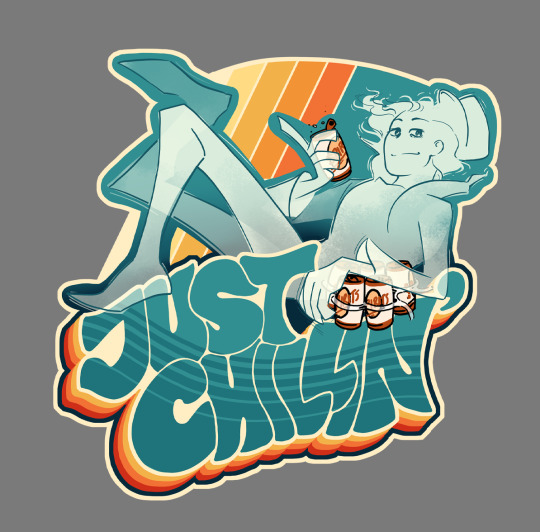
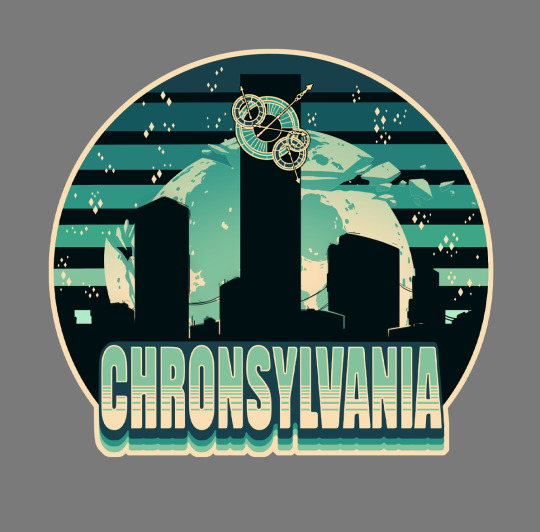
I seriously love getting to design things every month and send them out...
You can get these stickers if you sign up for one of my merch tiers before the month is over!
#sorry I have to self promo sometimes#I promised my friends I would#but also. I legitimately just extremely like these stickers so much#I might make these designs available for sale eventually (normal style)#and I also want to do more designs in this kind of general aesthetic...#its. I really like it hahahahhahaha#and I like how these came out a ton#so I think I wanna do some more like this! at least for a bit#anyways yeah if you like these then you can get them as a patron#but also just my merch tier is my favorite patreion thing and I love getting to design and ship stuff out every month. its so wonderful..#MY FAVORITE THING.... DESIGNING MERCH...#great way to support me while getting something out of it lmao#I mean you can also just look at my patreon in general#I wish sooo fucking bad I could post updates early there but it's against my contract#so. just previews for now...#next comic for sure though.#stickers#patreon#self promo#ugh I am just so happy with these....
65 notes
·
View notes
Text
i am opening up a ko-fi thang for monthly support!!!
hello hello if you are one of the three people who remember me opening up a patreon a while ago. and then doing nothing with it. its because i hate patreon and it sucks so instead i decided to just do monthly support on kofi WHICH I ALREADY USEEE ANYWAYSSSSSS for commishuns :)
HOW IT WILL WORK the monthly support tier is five dollar a month and grants you THREE thingies a month! those thingies are - two (2) Behind the Scenes/Upcoming Projects preview posts before anybody else gets to see the projects in question (cookiefish stuff, upcoming merch, random one off things that i dont usually announce and sometimes just shadow drop, etc). these will be posted on the TWELFTH of every month and also the TWENTY FOURTH. of every month - one (1) Finish That WIP poll where you get to vote on which dusty rotting illustration WIP i have to drag out of the folder and give new life. you also get to see the illustration a lil early before i post it on these here socials!

eventually i would love to do a sticker club type thing as well!!! but i need money to make stickers. and i have none. which is why im opening this with three posts per month for now oh yeah 😎
so yes if you would like to support me on ko-fi in a monthly type of way!! here is this!! even if there is literally just one person on the tier i will still post my thangs. and i will worship that one person 4evar....because the fact that anyone cares about what i make is really amazing and the fact that people sometimes want to give me money for it is even more bonkers.... which is why the tier is called binky bonk....
so ya!! if youd like to support me monthly, you can do that starting today!
and today is the eleventh but idc im announcing this early... so there is ONE POST ALREADY THERE!!! holy freak..........
#enderslime kofi#enderslime merch#how the feak do i tag this#idk. the winds will make sure it reaches who it needs to reach#fly post fly
15 notes
·
View notes
Text
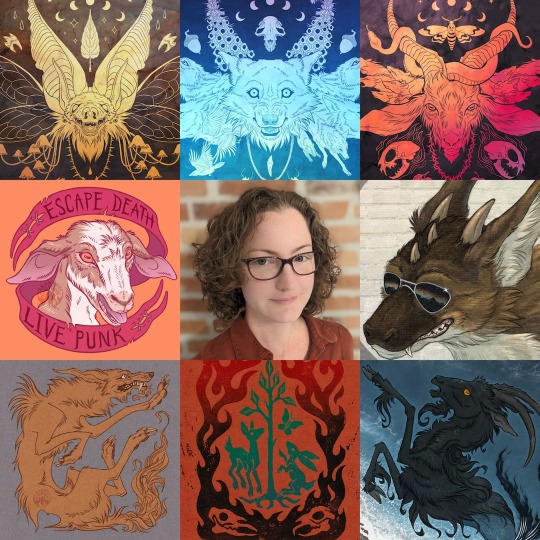
Who drew these Capricorns? It's me! I did it. S...Sorry.
HI TUMBLAR. I'm Dana. I draw animals and mythical creatures (mostly capricorns and dragons). I like to reflect on lesser-known or dark aspects of nature, feelings of distress and despair, or creating designs that just look cool for the sake of looking cool. I have a sort of positive nihilist outlook on life, in that I'm rather upset with the general state of things but I still feel compelled to find or create beauty and interest anyway, even if my darker feelings sometimes come out through my work.
"Abandon Ambition" is both grimly serious and darkly humorous. I was raised in both a household and country that emphasized setting lofty goals of acquiring high earnings and impressive assets, but the timing of my pursuit of these things has laughably aligned with global financial crises, global pandemics and lockdowns, and now global heatwaves and global conflicts. Abandon ambition, and instead embrace what you want to say and do and create and build now; Tomorrow is not yours, and your goals may not be waiting for you there.
Be responsible, and be kind. But hope and wait for nothing.
So uh, yeah, I draw a lot of stuff and explore a lot of things that I think I've been holding back on for years for one reason or another. I want to draw dark goats, glowing bats, tempest capricorns, skinny dragons, snarling wolves. So here they are.
Check out what I made!
A lot of my designs find themselves on fun and/or practical merch! I like to create things that are high quality and have a long shelf life: I don't want to make something thinking it'll go in a landfill in a year, I want you wearing and enjoying my work for a very long time.
Here's a hat that glows in the dark!

Wow! Here's another hat that doesn't glow in the dark, but still looks really nice.
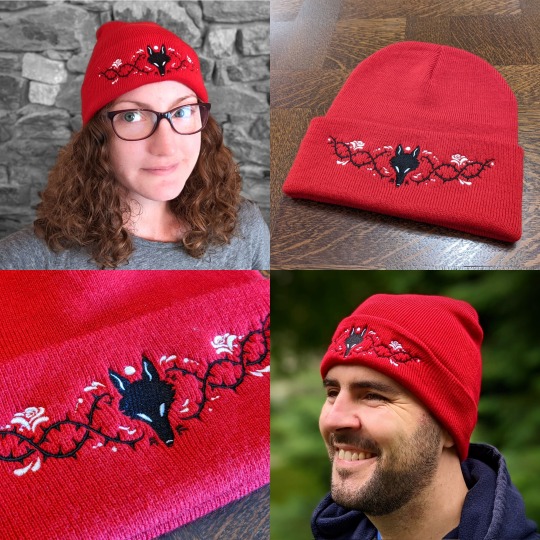
Pretty! If keeping your skull cozy isn't your thing, I've printed my art on fabric, too. I like this idea because if you move house a lot and/or can't afford custom frames, art printed on fabric can be displayed anywhere, and folds up nicely when packing up for your next move, without any breaking glass or anything.
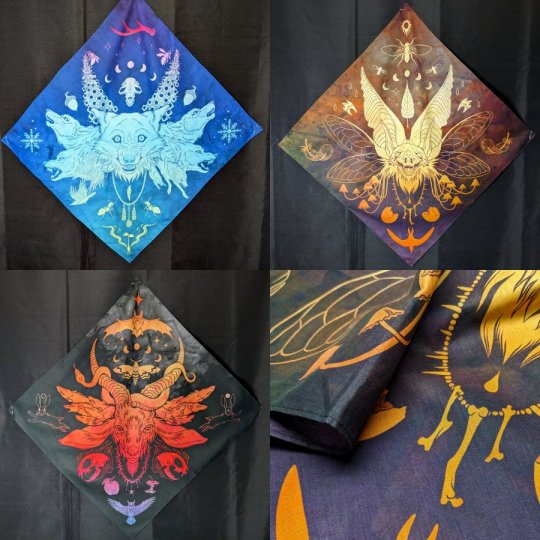
A big part of my thinking when I'm designing products is also what do I myself use in my day-to-day life, and lately I've been desperately trying to cut my phone addiction by going back to pen-and-paper planners and books and things instead of using screens. And to keep track of where I am in my planners and books, I've made bookmarks!
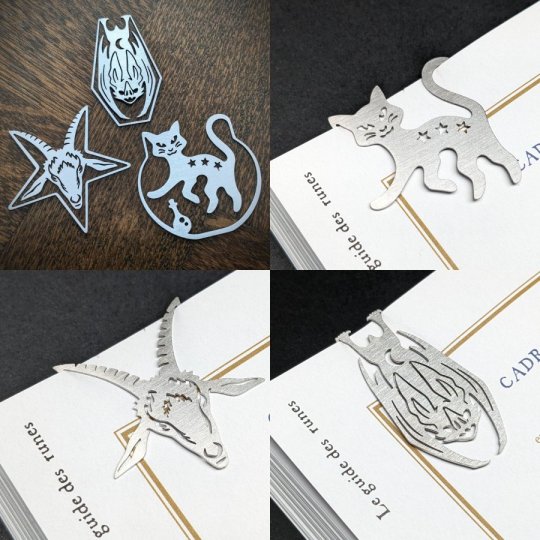
I had so much fun designing these. You have something enjoyable to look at on both sides of the page it's clipped on. How fun is that?
Okay lastly, I make a TON of stickers. A lot of my designs translate really well into small, self-contained things like stickers, and I only ever print vinyl stickers, so they live a long time on your laptop or phone case or wherever you wanna put them.

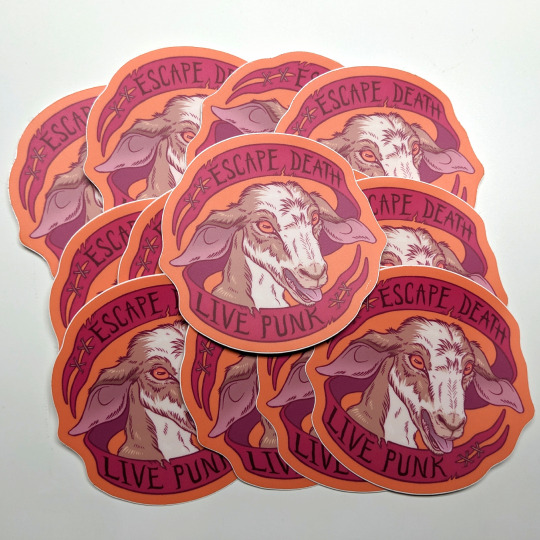
So that's a small collection of the things I've done and made. Do you like them? I hope you like them. I liked designing them.
A COOOUPON JUST FOR YOUUUU
If you'd like one o' these things for yourself, you're in luck!
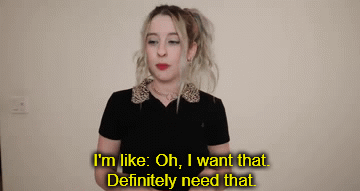
You, lucky Tumblar user, can visit my shop and take 20% off with code TUMBLR20. This coupon expires 1st April 2024 (or does it...? That's April Fools' Day after all... Okay yeah it does actually expire then. Sorry).
Oh, commissions?
Hey! Sometimes people like my art style and want a custom commission. That's great, and I'm so glad you're interested!
If you'd like a custom ink mailed to you on a postcard that also features my art on the back (so it's like... you get two pieces of art on one postcard), these are exclusive to my Patreon right here. I have limited slots per every month, so check back often in case I'm sold out.
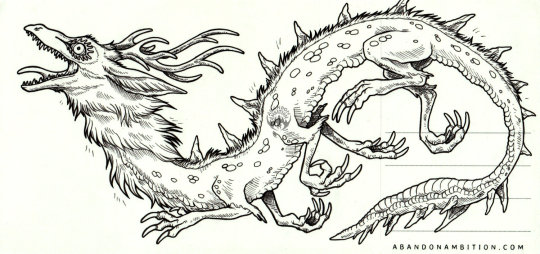
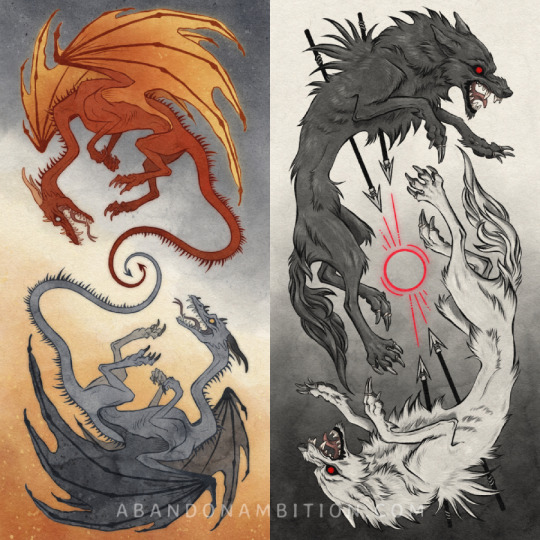
I also offer what I call "instant order" commissions via my Ko-Fi. You pick out one of the offerings I have, send me your ref sheet, pay, and I just...get it done. It's as close to instant as commissions can get.
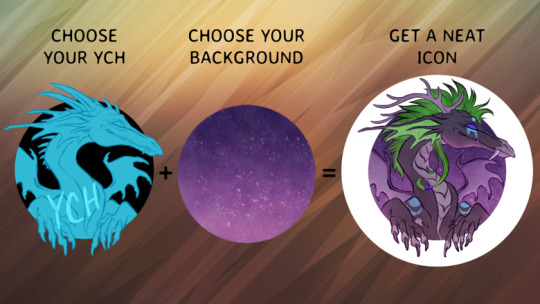
Besides those, I also do more bespoke work, so you can send me a message to discuss your idea and we'll work something out. :corporatethumbsupemoji:
Honestly? Thanks!
The internet has become a pretty weird and honestly rather hostile place. I'm a solo act that's as indie as they get. So, it really does mean a lot to me when your eyeballs land on my stuff and you click that little heart or reblog icon, or even better when you add it to your cart and click check out. Your eyeballs land on thousands of stuff every day, so the fact that my stuff brought you joy or interest or something deep that you resonated with means a lot to me. I think in a sense it makes me feel like my brush strokes are going somewhere far beyond whatever canvas I've otherwise confined them to.
This is a pinned post to share who I am and help me get some coins to fund my life and art projects, but yeah you can reblog it and share it around planet earth, I don't mind. It's nice.
So yeah, that's me! Feel free to comment if you have questions or want to know whatever else, I'll uh... reply and like answer them and stuff.
#artist alley#tumblr artist alley#art#drawing#animal#animals#artwork#creature#creatures#artist#goat#occult#baphomet#bat#cat#biquette
29 notes
·
View notes
Text
1 year of Idiot Quest!
Whoa the time really has flown by!
Exactly a year ago I was in a really bad place in terms of art- I'd had several horrible clients in the space of a couple of weeks and my confidence was crushed. I closed commissions for the foreseeable future and decided to focus all my energy on starting the comic series I'd been planning for a year.
I was terrified at the time. I still am lmao. I'm still not 100% with art again, I still get anxious about it a lot, but I'm proud I managed to keep it up for a whole year and I hope to carry it on throughout 2019 too!
To my Patrons, thank you so so much for the support <3 I'm still amazed people actually enjoy my art enough to pay me for it and it's really kept me motivated every week. I already posted about this on Patreon, but I'll be updating my rewards at the end of this month to include full-bodies and headshots which is a huge step for me, getting back into commission work, but I'm really looking forward to it!
Here are my updated patron rewards:
Novice: $2
Patrons at this level will have access to:
- EVERYTHING I post on Patreon!
- The weekly comic as soon as it's finished (usually the day before it's posted elsewhere)
- Exclusive content delving deeper into the backstories of the characters and more serious events of the campaign in the form of art, comics and stories. Stuff like this won't be posted anywhere but Patreon.
- WIPs and sneak peeks at any other projects that may be in the works
- Early access to any other comic series I do (including an Idiot Quest spin-off series that's currently in the works)
Apprentise: $7
There are no additional rewards at this tier; it's just for those who want the $2 benefits but are willing and able to give a little more to show their support and I will eternally love them for their kindness <3
Adept: $14
Patrons at this level:
- Will have access to all previous tier rewards
- Will be able to request a free headshot drawing (coloured) every month!
Expert: $27
Patrons at this level:
- Will have access to all previous tier rewards
- Will be able to request a free full-body drawing (coloured) OR two head-shots (coloured) every month! I'll be updating them at the end of this month so they'll come into effect in March. My patrons are charged at the beginning of each month so if you sign up this month you won't be charged until March when the new rewards will be in place! I'm aiming to be much more active on Patreon this year with extra art and info about Ham and co., our campaign, as well as giveaways and hopefully physical rewards like prints, stickers and badges if I can make enough money to afford to make them. I'll always post the comic weekly here, I'll just be posting a lot of extra stuff just for my patrons because I love them and they deserve everything I have to offer <3 If you'd like to become a patron you can find me here: www.patreon.com/npc_jes And to those of you who can't afford to throw a li'l money my way each month, that's okay! I love and treasure every single drop of support I get for Idiot Quest- all the likes and especially the reblogs, they all help keep me motivated and I really really appreciate every single one! <3 So, yeah. That's about it for this ramble. I don't give myself credit often but even I can see the quality of my art has imporved a lot since I started IQ a year ago and I can't wait to see where I am by this time next year! As always, thanks so much for the support <3
- @npc-jes
#idiot quest#idiot quest comic#dnd#Dungeons and Dragons#d&d#d&d 5e#patreon#comic#webcomic#art#digital art
2 notes
·
View notes
Text
Okay this is a long post but please bear with me. I just want to give an update about upcoming life/job changes that will also affect my shop, convention schedule, and Patreon.
OKAY SO! I do have some exciting, important life changes coming up. I have finally secured a full-time art job in Michigan! Yay! I will be an art assistant to start out with and probably not actually doing much drawing. And when I do start doing more artwork, it will be vector art in Adobe Illustrator, so very different from what I normally do and post on this blog, Insta, etc. Idk if I will even be able to post the stuff at all I do for this job though but hey! It’s full time! So I’ll be getting paid well for it. And it being very well from my usual work means I won’t get burnt out on my own art.
However, because of the attendance policy for newcomers, I don’t think I’ll be able to do Youmacon if I get in off the wait list this year. Which sucks. But it’s a necessary sacrifice I’ll have to make. The one day off I’ll get in my first 90 days will have to be used for Grand Rapids Comic Con, since I was already accepted to that con and paid for it long ago. There is a TINY change I could do Youmacon if I got in, but most likely I won’t be able to. So my next and last cons for sure for a while will be Capital City Comic Con this Saturday September 8th, 2018 in Lansing, MI, and Grand Rapids Comic Con on November 9th-11th, 2018 in Grand Rapids, MI.
Also, my current seasonal part-time job is now down to just Saturday-Sunday weekends, then in October, Friday nights for our Halloween event, with the last day of our season being October 21st. So I start my full time Monday-Friday job on September 10th, and will be working at my other job on the weekends till October 21st. So I’ll have a very jam-packed schedule and probably only be able to do sketches until then, which is why I’ve actually been posting my sketches on social media rather than just keeping them Patreon exclusives lately. I don’t want to just not post art because of this. Also, I do still plan on doing Drawtober this year. It’ll be a much bigger schedule this time around because I’ll likely be working 7 days a week but....I’ll make it work lol.
Also, my new job will be 7 AM - 3 PM, Monday-Friday, which means plenty of time in the afternoon and on weekends (after the season for my other job ends) to draw! But also until @garcondesfleurs and I can save up enough to move into a new place, I will be driving an hour and 20 minutes to work, and an hour and 20 minutes back home. So there will definitely be a big adjustment period with the long and tiring commute lol. I will have to get up early than ever before on a regular basis. But it will be worth it. This job has health, vision, and dental insurance, is closed with PTO on major holidays, and also starts off with 5 other paid days off after your first 90 days with acquiring more days off the more years you work there. And they have reviews every 6 months with the opportunity for a raise if you meet the qualifications for how much you’ve improved. So I just couldn’t pass this opportunity up.
However, you can’t have your cake and eat it too. Because of limited days off, I probably won’t be able to do NEARLY as many conventions for the next couple of years. Which means there won’t be a need for me to make as much merch like stickers, charms, acrylic pins, buttons, etc. Not to mention I won’t want to use as much of my free time to make them. While I love making smaller merch, I often put other personal projects I am more passionate about aside to pump out the smaller merch like charms and stickers because they are my big money makers. But now I will have money from this job, so I won’t have to worry about this, and can focus solely on what I want to draw the absolute MOST in my free time.
It also means I will likely have to simplify my Patreon. I likely won’t be able to keep up with the amount of tiers I have right now while having a full time job as well, especially during the time when I'm also working the part-time job on top of it, and I may not be able to keep up with the physical rewards of stickers, charms, etc because I may not be producing enough new designs for small merch to send Patrons non-repeats. So after this month’s physical rewards, I will likely have to do another Patreon overhaul for the sake of my own sanity, with less tiers and likely no physical rewards other than digital coupons for my Etsy. I don't want to overwork myself into the ground with too many tasks and little to no breaks and wind up with bad physical and mental health because of it.
I will still be doing my own art though! I’m actually very excited because I think the financial stability from this art job will allow me to have a greater sense of freedom in what I can do on my own. And I’m actually really looking forward to it. :3
The other issue I was having was the money from cons and my shop was just enough to supplement my day job to pay bills, groceries, etc, but not pushing it over the edge to where I’d have a good cushion to make more new merch and pay for more con tables. So even if I was profiting well off cons, minimum wage money from a part-time seasonal day job meant that those con profits just went right into my living expenses basically, not leaving me much room to do more, not only in the way of making new merch and signing up for new cons which created its own conundrum, but also to just do other fun life things...not to mention move out.
So yeah. It will be a lot of big changes at first, and I hope I don’t disappoint anyone with the changes to my convention schedule, my Patreon, and the amount of stickers, charms, etc I produce and sell in my shop but...I think it will be worth it for me in the end. Especially if I can go back to doing more art that isn’t just stickers and charms again soon. I miss doing other illustrations more frequently lol.
So yeah. Thank you for reading through this long post, and for sticking around this blog and liking my art and stuff. :3 I hope you all have a lovely week~
1 note
·
View note
Text
A Couple Announcements
I posted this on Patreon, but wanted to share it here too for folks who don’t follow my page. New for Patrons: I've decided to open doodle requests for Patrons similar to my ko-fi doodles except instead of something random I come up for that person, I want to let you request for Fav Characters, OCs, YOUR DOGS PLEASE (+ other animal friends). So yeah. :> They will be simpler than the monthly art raffles though! Just to make a distinction between rewards.
News for Everyone: I also made a google form to ask when you would like to have streams every now and then. Not sure at the moment if I can commit to every week but if I can get a general idea of when you guys are free, we can work something out! (You can also give me feedback at the end) So fill out this form when you can: https://goo.gl/forms/5ikbpLg07GjXrzBa2
We are 9 bucks away from sticker sheet rewards! Spread the word if you can. $1 Pledges go a long way and you will get exclusive sneek-peeks of new artwork and stuff I only post on Patreon. Including requests and art raffles! Pledge to me at patreon.com/thelotusmaiden And as always if money is too tight to commit to every month you can donate to my ko-fi instead! Any support is so greatly appreciated. <3
Thanks for reading my long post! Have a great day.
7 notes
·
View notes